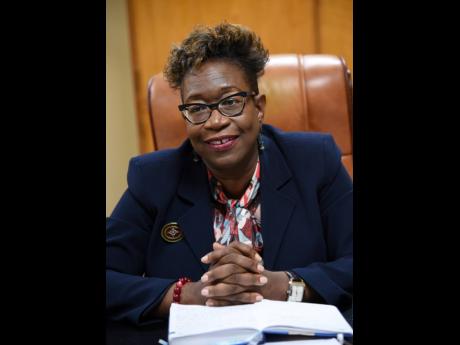Attorney: Llewellyn has not resigned
King’s Counsel Douglas Leys, who has been retained by incumbent Director of Public Prosecutions Paula Llewellyn, says she has not stepped down from her post.
“I can say affirmatively that she has not resigned, and it would not be advisable for her to resign her position until the Court of Appeal has finally determined the issues,” Leys told The Gleaner yesterday.
Asked whether Llewellyn is on a leave of absence, Leys replied that “she is not in office”.
The former solicitor general’s revelation comes amid calls by the Jamaica Bar Association (JAMBAR) for clarity on the appointment of acting DPP Claudette Thompson.
The association wants a clear explanation on whether the acting appointment was made based on the DPP’s post being vacant or through Llewellyn’s inability to perform the functions of the office.
Llewellyn on Monday “stepped aside” as the attorney general indicated that he would be appealing the aspect of Friday’s Constitutional Court ruling on the validity of her extended tenure.
INVALID AMENDMENT
The Full Court had ruled that the change in the Constitution in July last year, to raise the age of retirement for the DPP and the auditor general from 60 to 65, was valid. However, the amendment allowing Llewellyn to choose to remain was invalid.
A panel of judges comprising Justices Sonya Wint-Blair, Simone Wolfe-Reece, and Justice Tricia Hutchinson Shelly noted that “the incumbent DPP has already reached the extended retirement age, [which] means that the application of Section 2(2) cannot lead to another extension by way of an election on the part of the incumbent DPP as this is unlawful”.
The DPP reached the age of retirement in 2020 but got a three-year extension, which ended in September 2023.
The judges further ruled that the only lawful way to extend Llewellyn’s current tenure is by agreement between the prime minister of Jamaica and the leader of the Opposition.
Opposition lawmakers Phillip Paulwell and Peter Bunting had initiated the challenge to the amendment to the Constitution while the attorney general was the respondent in the matter.
King’s Counsel Michael Hylton, who represented Paulwell and Bunting, argued that the ruling meant that Llewellyn would have to leave office immediately.
However, other parties, including the Attorney General’s Chambers and Minister of Justice Delroy Chuck, were of the view that no such order had been made.
The attorney general consequently advised that after careful consideration and in the interest of the public, he would be appealing the ruling to have the issues resolved and determined by the Court of Appeal.
In The Sunday Gleaner, legal experts warned that there could be “a great risk” if Llewellyn continued to exercise the powers of the office in the wake of the ruling.
In a release later on Sunday, the Attorney General’s Chambers said that the DPP had advised that “she is unable to carry out the functions of her office at this time” and that the Public Service Commission (PSC) would be invited to appoint a qualified person to act in the role.
But JAMBAR, in a press release yesterday, pointed to the advisory, noting that the inference could be made that Llewellyn remains the holder of the substantive post of a DPP but is unable to perform the functions of the office, and Thompson is acting as DPP on that premise.
At the same time, JAMBAR questioned whether the words “any reason” can properly be interpreted to include a court ruling that declares as null and void the premise on which that particular individual holds the office.
“The danger of that interpretation of Section 96(3), if it is incorrect, is that it gives rise to a further and even more serious question of whether the acting DPP could properly have been appointed until the Attorney General’s appeal against the court ruling is heard,” JAMBAR says.
It also states that if the acting appointment was made based on Llewellyn’s inability to perform the functions of the office, the PSC must clarify the reason for the inability.
Several calls to PSC Chairman Patricia Sinclair-McCalla for comment went unanswered. Similarly, Gleaner calls and messages sent to AG Derrick McKoy went unanswered.
The question pertaining to whether Llewellyn’s reason for leaving office would be covered under Section 96 (3) of the Constitution was posed to Leys, but he indicated that it was outside of his remit and was a question for the AG.
“As you know, there is an appeal. I can’t speak for the authorities , but having regard to the fact that there is an appeal, it would be imprudent for them to appoint somebody to be DPP until the questions have been finally determined on appeal,” he added.
Leys, in the meantime, shared that he would be making an application for leave to intervene to argue on Llewellyn’s behalf in the Court of Appeal. According to him, all the parties have asked for the matter to be expedited.
Human rights lobby Jamaicans for Justice (JFJ), in the meantime, has renewed its call for the appointment of a permanent DPP.
JFJ is of the view that there is no ambiguity arising from the ruling and that the office was rendered vacant as of September 21, 2023, based on Friday’s ruling.
“Of grave concern and that which requires clarity, in advising the appointment of an acting DPP, the State noted Ms Llewellyn’s voluntary but seemingly temporary departure from the role,” it said.
Furthermore, the group argued that Section 96(3) of the Constitution was never intended for an acting DPP to be so appointed as an interim office holder pending an appeal to an adverse court ruling.

